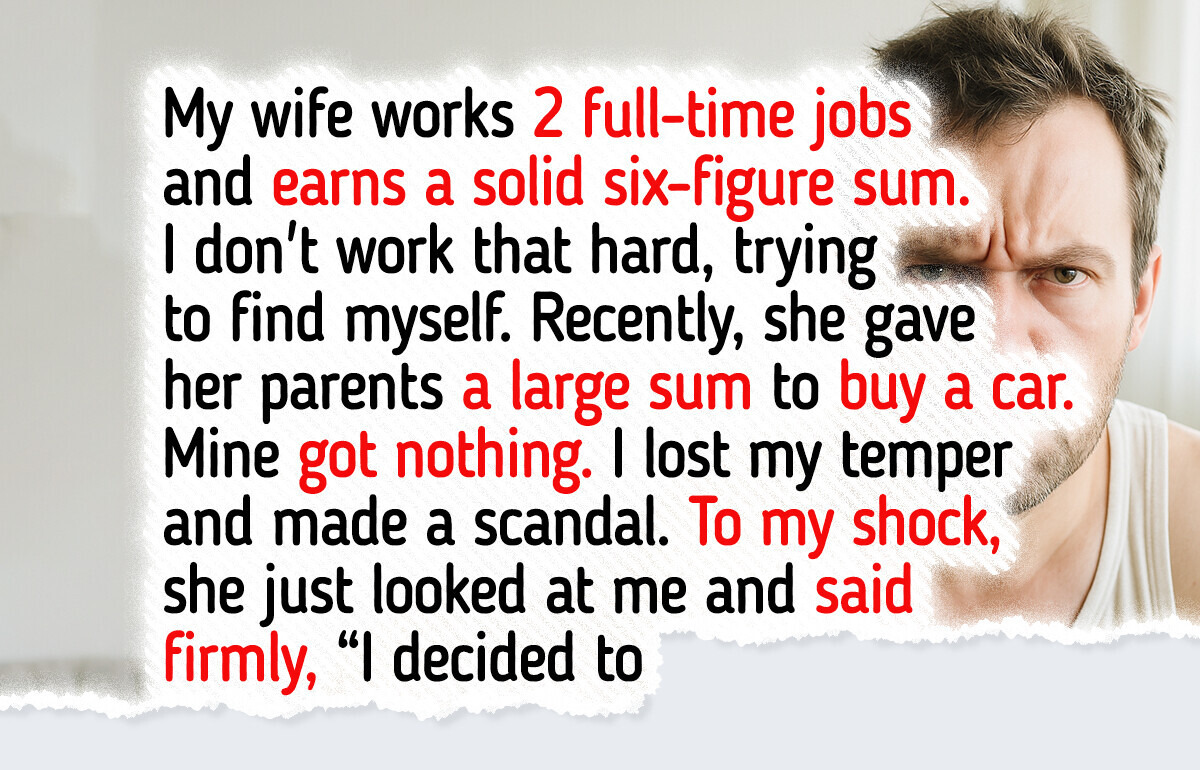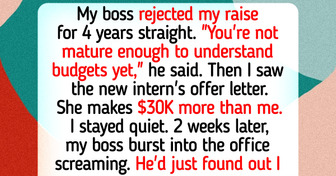You're absolutely not wrong for wanting your wife to help your parents equally....No....What you are is a man-child who won't get off his fanny and be the equal partner that you were squawking about. It can't be equal if it's built on a foundation of inequality. GROW THE F UP!!!
My Wife Refuses to Spend Her Massive Income for My Parents’ Needs

A man — who asked to remain anonymous — wrote to us about his marriage of eight years. His wife, according to him, is strong, ambitious, and financially successful. He, on the other hand, is still “finding his path.” For the last five years, she’s carried the financial load for the household, while he’s contributed what he can through occasional gigs and emotional support.
But now, the marriage is teetering on the edge of something bigger. It’s not about love, or chores, or even money — not exactly. It’s about family, and what fairness really looks like when one partner earns a lot... and the other doesn’t.
He says all he wants is equality. She says she’s done being his safety net. What started as a quiet tension over in-laws has now sparked a conversation that might just cost them their relationship. Here’s what he told us.

Here’s the man’s letter to our editorial:
"Hi Bright Side,
I (34M) have been married to my wife (35F) for 8 years. She’s a strong woman, very independent, always pushing herself. Honestly, she’s kind of a powerhouse — she works two full-time jobs (remote marketing + freelance consulting), it’s been so for the past 5 years. Together, she makes around $160,000 a year.
Meanwhile, I’m currently “between careers.” I do some freelance graphic design and occasional gigs — in a good month I bring in maybe $800—$1000, but it’s inconsistent. I’m still trying to find myself, I don’t work that hard and never will.
Because my income isn’t stable, she’s been the main breadwinner for the last 5+ years. She pays the mortgage, the bills, food, car expenses — everything. We live in a nice house in a decent suburb, drive two reliable cars, and have health insurance because of her.
Now, here’s the issue. Her parents are getting older (mid-60s), and she and her siblings regularly pitch in money for their care, home maintenance, and recently even helped them buy a new car — my wife chipped in about $8,000 from her savings for that. She also pays for things like their medications, takes time off to visit them, etc.
My parents are the same age, also retired, also not rich. They live modestly, but lately they’ve started asking (not directly, but you know how parents are) why my wife does so much for her family and not ours. My mom once pointedly asked if she was “less of a grandma” in our eyes, and I could tell it stung.
I brought this up to my wife — that I think it’s only fair she contributes equally to my parents too. Like, if she’s going to drop thousands on her mom and dad, why can’t she help mine with a vacation, or help fix their old roof? She did pay for my mom’s dental work once (around $1,200), so it’s not like she never helped. But lately she’s drawing a hard line.
She firmly told me she’s done being the only adult in this relationship. That I need to “step up” and “handle my own family.” She said from now on, she decided to separate finances, and I’ll be responsible for my income, and she’ll be responsible for hers.
I honestly felt betrayed. Isn’t marriage about unity? About partnership? Didn’t we say for better or worse? I told her that our money should be OUR money — that’s what being married is. And our parents are BOTH our responsibility.
She says that’s only fair if we’re both contributing equally. But how is that fair? I’m doing what I can, I’m still on my journey, and I’m supporting her emotionally and around the house. I cook dinner, clean, handle errands — that should count for something.
She told me that love is not an excuse for leeching off someone indefinitely, and that she “refuses to subsidize my guilt about my parents.” That really hurt. I’m trying. I’m not lazy. I just haven’t landed the right opportunity yet. And when I do — believe me, I’ll remember everything she’s said and done. I’m not going to forget this double standard.
So, dear Bright Side, am I wrong for expecting my wife to support my parents the same way she supports hers? Aren’t we supposed to be a team? I’m not saying she should stop helping her family. I’m saying it should be equal. That’s what fairness means, right?"
Dear reader,
Thank you so much for finding the courage to share your story with us—and with the Bright Side community. Navigating a long-term marriage that’s strained by financial and familial imbalances is never easy, and opening up about it already shows your commitment to finding a better path forward.
Here are our psychology‑based insights that may help you gain clarity and guide your next steps.
1. Rebuild emotional equity by addressing financial resentment.
It’s common to feel frustration when contributions feel unequal—especially when one partner carries most of the financial load. Rather than bottling up these feelings, acknowledge them openly (ideally using “I” statements like “I feel hurt when...”). Financial resentment acts as a signal that something important in your relationship is out of balance.
2. Set clear boundaries with your in‑laws.
You’ve taken on emotional responsibility for both families—now it’s time to approach this together. Sit down with your wife and establish mutual limits on financial support. According to relationship experts, when decisions about in‑laws are made as a united couple, it strengthens your bond and prevents resentment.
3. Lead the conversation in a “money date”.
Schedule a stress‑free, monthly chat dedicated solely to finances. A casual “money date” can help you and your wife align on shared goals and foster transparency. This ritual has been shown to reduce arguments and build trust—fusing financial planning with relationship maintenance.
4. Make your family contribution equal.
Research in relationship psychology highlights the importance of equity—perceived fairness based on each partner’s inputs and outputs—over strict equality. In real life, your “contributions” go far beyond monetary value.
Emotional labor, household tasks, your ongoing efforts to find stable work—all these inputs matter. When both partners feel their unique contributions are acknowledged and valued, it builds a sense of fairness, even if earnings differ. Recognizing and discussing this broader picture can help both of you reset expectations and redefine what “fair share” truly means in your marriage.
And here’s yet another letter from a man named Sam, who also has a difficult choice. This time it’s not about a husband and wife, but about a dad and his daughter. Sam shared how he dedicated all his efforts to raise his daughter, only to find out one day that she prefers her mom’s new boyfriend over her real dad. Sam is on the crossroads now and seems like he’s about to make a very tough and painful choice in his life. Read his story here.
Comments
I'm gonna say it.... Brightside, you've finally proven that you are just as ignorant as this yahoo. Equality my Aunt Fanny. There is no equality here.
Related Reads
My Husband Betrayed Me So Hard That I Almost Died, Now Everything Blew Up in His Face

I Refuse to Be the Lowest Paid Person in the Company, Now Everyone Knows Why

18 Stories That Prove Living in an Apartment Is Like Having a Front-Row Seat to a Comedy Show

I Turned Down a Promotion and Got Fired—My Revenge Was Brutal

10 Times a Moment of Pure Cruelty Was Actually a Secret Act of Kindness

15 Stories That Prove Some Memories Are Impossible to Delete

My Parents Abandoned Me at 18, Now They’re Begging for My Forgiveness

I Refused to Turn Our Romantic Trip Into a Family Vacation and Faced the Consequence

My Parents Refused to Fund My Education, So I Turned the Tables on Them

My Parents Wanted a ‘Family Vacation’ on My Budget—I Made One Move They Didn’t Expect

I Refuse to Earn Pennies While My Manager Cashes a Fortune

I Refuse to Let My Daughter Attend Her Dad’s Wedding




